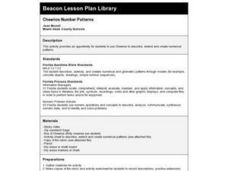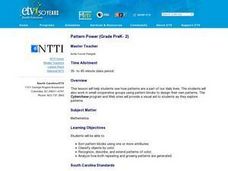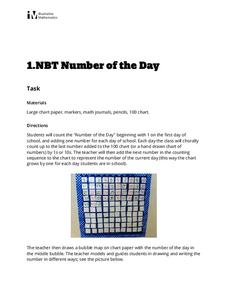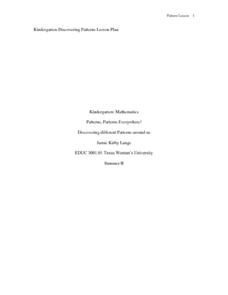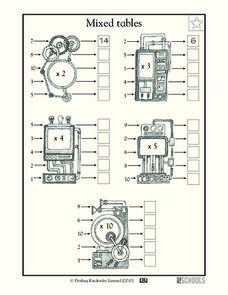Curated OER
Recognizing and Extending Number Sequences
Kids work to recognize and extend number sequences. They determine the rule in order to find the missing number in each sequence given. They review the concept, practice finishing sequences with a calculator, and explain each rule.
Curated OER
Cheerios Number Patterns
Young scholars, following a provided worksheet, use Cheerios to explore number patterns.
Math in English
Number Patterns
Build the pattern recognition skills of young mathematicians with this simple skills practice worksheet. Given nine different sequences of two-digit numbers, children must identify the pattern and determine the next three numbers in...
Curated OER
Patterns Patterns Everywhere
Upper graders work with number patterns. In this pattern lesson, learners recognize and continue number patterns and find the rules. They do some as a class and complete an assessment.
Common Core Sheets
Determining Coordinates: Graphing Patterns
Building on their prior knowledge about patterns, this series of worksheets introduces young mathematicians to graphing in the coordinate plane. Using written descriptions of different numerical patterns, learners create sets of order...
Curated OER
Number Sequences
Number sequences make for great challenges that stimulate pattern recognition, algebraic reasoning, and number sense. This slide-show includes eleven number sequences for learners to work through, an explanation of what number sequences...
Curated OER
Extending Geometric Patterns
Which square comes next? Each of these sequences is made up of patterned squares in a continuing order. Learners examine more squares to choose which one(s) would correctly continue the pattern. None of these have very complex sequences;...
PBS
Patterns to the Rescue!
Track down the Cyberchase episode that this lesson is associated with. Using a worksheet that is embedded in the plan, learners must find the next two numbers and shapes (a double pattern). Once these have been discovered, pupils try...
Curated OER
Pattern Power
Young elementary students will discover there are patterns all around them in their daily lives. In groups, they sort pattern blocks by size and color. Using the internet, they create their own type of patterns and share them with the...
Curated OER
Patterns Everywhere!
Learners recognize and demonstrate the patterning of numbers and objects in our environment. They create a pattern using geometric shapes and find a missing number in a sequence.
Curated OER
Recognizing and Extending Number Sequences
Number sequences and pattern recognition are vital skills for understanding more complex mathematical concepts. Practice determining the rule with your class. Each slide shows a sequence of numbers, they need to work together to find the...
Curated OER
Visual and Number Patterns
Fourth graders develop strategies for identifying geometric and number patterns. In this mathematical patterns lesson, 4th graders use pattern blocks to make repeating patterns with numbers and shapes. Students then explore number...
K-5 Math Teaching Resources
Pattern Blocks
Who needs to buy pattern blocks when you have this printable pattern block template? Including triangles, squares, trapezoids, rhombuses, and hexagons, this resource offers endless possibilities for teaching children about geometric shapes.
Illustrative Mathematics
Number of the Day
Daily routines not only help to manage classrooms, they can also provide learners with rich opportunities for learning. This activity supports young learners in developing their number sense by counting up the school days on a class 100...
K12 Reader
Extending Patterns
2, 4, 6, 8. What comes next? This reading comprehension learning exercise discusses patterns and extending patterns. After reading the short article, kids answer a series of questions to demonstrate their understanding of the passage.
Texas Woman’s University
Patterns, Patterns Everywhere!
Not only is pattern recognition an essential skill for young children to develop, it's also a lot of fun to teach! Over the course of this lesson, class members participate in shared readings, perform small group activities, and complete...
Oregon Department of Education
Building Number Sense
It's never too early to begin a child's math education. This collection of fun hands-on activities engage youngsters in building their number sense as they learn how to count objects, identify numerals, compare amounts, and much more.
Mississippi State University
The Five Senses
Your learners engage their five senses every day without knowing it. Help them identify their experiences and extend their understanding with a month full of lessons designed for the five senses. Kids focus on a different sense every...
Inside Mathematics
Conference Tables
Pupils analyze a pattern of conference tables to determine the number of tables needed and the number of people that can be seated for a given size. Individuals develop general formulas for the two growing number patterns and use them to...
Curated OER
Representing Patterns & Evaluating Expressions
Write algebraic expressions, determine patterns, and evaluate expressions in a real-world context. Learners engage in a series of collaborative activities to identify, model, and give variables for real-world patterns. They write...
Curated OER
Identifying Patterns
What's the pattern? Beginners with this skill examine four sets of objects to determine a pattern, continuing it by drawing the rest of the objects in the space provided. Next, they do the same but with two numeric patterns. These don't...
Curated OER
Mixed Tables
Who knows how to operate these multiplication machines? Young mathematicians examine five machines, each with a specific function (i.e. x3) to transform the input numbers to output numbers. They send five numbers through each machine,...
Curated OER
Mixed Tables
These dinosaurs act like math machines as scholars practice their division skills. Each one has a given division function to apply to four incoming dividends. Pupils complete the equations, writing in the quotient for each. There are no...
Curated OER
Identifying the Patterns
What pattern do you see? Preschoolers examine four visual patterns and complete them after observing the repeating designs. Then, they create two patterns of their own. Because these are all drawn into circles, consider extending this to...



